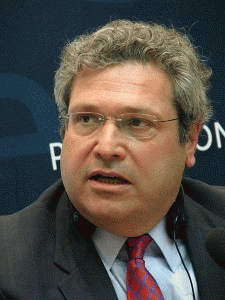Reprinted from Consortium News

Prominent neocon intellectual Robert Kagan.
(Image by (Photo credit: Mariusz Kubik, mariuszkubik.pl)) Details DMCA
Prominent neocon Robert Kagan has endorsed Democrat Hillary Clinton for president, saying she represents the best hope for saving the United States from populist billionaire Donald Trump, who has repudiated the neoconservative cause of U.S. military interventions in line with Israel's interests.
In a Washington Post op-ed published on Thursday, Kagan excoriated the Republican Party for creating the conditions for Trump's rise and then asked, "So what to do now? The Republicans' creation will soon be let loose on the land, leaving to others the job the party failed to carry out."
While many of Kagan's observations about the Republican tolerance -- and even encouragement -- of bigotry are correct, the fact that a leading neocon, a co-founder of the infamous Project for the New American Century, has endorsed Clinton raises questions for Democrats who have so far given the former New York senator and Secretary of State mostly a pass on her pro-interventionist policies.
The fact is that Clinton has generally marched in lock step with the neocons as they have implemented an aggressive "regime change" strategy against governments and political movements that don't toe Washington's line or that deviate from Israel's goals in the Middle East. So she has backed coups, such as in Honduras (2009) and Ukraine (2014); invasions, such as Iraq (2003) and Libya (2011); and subversions such as Syria (from 2011 to the present) -- all with various degrees of disastrous results.
Yet, with the failure of Republican establishment candidates to gain political traction against Trump, Clinton has clearly become the choice of many neoconservatives and "liberal interventionists" who favor continuation of U.S. imperial designs around the world. The question for Democrats now is whether they wish to perpetuate those war-like policies by sticking with Clinton or should switch to Sen. Bernie Sanders, who offers a somewhat less aggressive (though vaguely defined) foreign policy.
Sanders has undermined his appeal to anti-imperialist Democrats by muting his criticism of Clinton's "regime change" strategies and concentrating relentlessly on his message of "income inequality" -- for which Clinton has disingenuously dubbed him a "single-issue candidate." Whether Sanders has the will and the time to reorient his campaign to question Clinton's status as the new neocon choice remains in doubt.
A Reagan Propagandist
Kagan, who I've known since the 1980s when he was a rising star on Ronald Reagan's State Department propaganda team (selling violent right-wing policies in Central America), has been signaling his affection for Clinton for some time, at least since she appointed him as an adviser to her State Department and promoted his wife Victoria Nuland, a former top aide to Vice President Dick Cheney, to be the State Department's chief spokesperson. Largely because of Clinton's patronage, Nuland rose to assistant secretary of state for European affairs and oversaw the provocative "regime change" in Ukraine in 2014.

Assistant Secretary of State for European and Eurasian Affairs Victoria Nuland during a press conference at the U.S. Embassy in Kiev, Ukraine, on Feb. 7, 2014.
(Image by (U.S. State Department photo)) Details DMCA
Later in 2014, Kagan told The New York Times that he hoped that his neocon views -- which he had begun to call "liberal interventionist" -- would prevail in a possible Hillary Clinton administration. The Times reported that Clinton "remains the vessel into which many interventionists are pouring their hopes" and quoted Kagan as saying:
"I feel comfortable with her on foreign policy. ... If she pursues a policy which we think she will pursue ... it's something that might have been called neocon, but clearly her supporters are not going to call it that; they are going to call it something else."
Now, Kagan, whose Project for the New American Century wrote the blueprint for George W. Bush's disastrous Iraq War, is now abandoning the Republican Party in favor of Hillary Clinton.
Though Kagan's Post op-ed is characteristically erudite with references to Greek mythology and the French Revolution, it presents a somewhat skewed account of how the Republican Party lost its way. In Kagan's telling, the problem emerged from its blind hatred of Barack Obama's 2008 victory, "a racially tinged derangement syndrome that made any charge plausible and any opposition justified."
The truth is that the Republican Party has harbored ugly tendencies for decades, including the red-baiting McCarthy era of the 1950s, Barry Goldwater's hostility to civil rights laws in the 1960s, Richard Nixon's "Southern strategy" in 1968, Ronald Reagan's appeal to racial bigotry in the 1980s, George H.W. Bush's race-baiting "Willie Horton commercials" of 1988, and the GOP's more recent support for a New Jim Crow era -- hostile to black voting and to social programs -- along with the party's anti-Latino bigotry and hostility to immigrants.
As a Reagan apparatchik who continued to rise with the neocon tide in the 1990s and early 2000s, Kagan doesn't take the Republican exploitation of American fears and prejudices back that far. Instead, he starts the clock with Obama's election, writing, "there was the party's accommodation to and exploitation of the bigotry in its ranks. No, the majority of Republicans are not bigots. But they have certainly been enablers.
(Note: You can view every article as one long page if you sign up as an Advocate Member, or higher).





